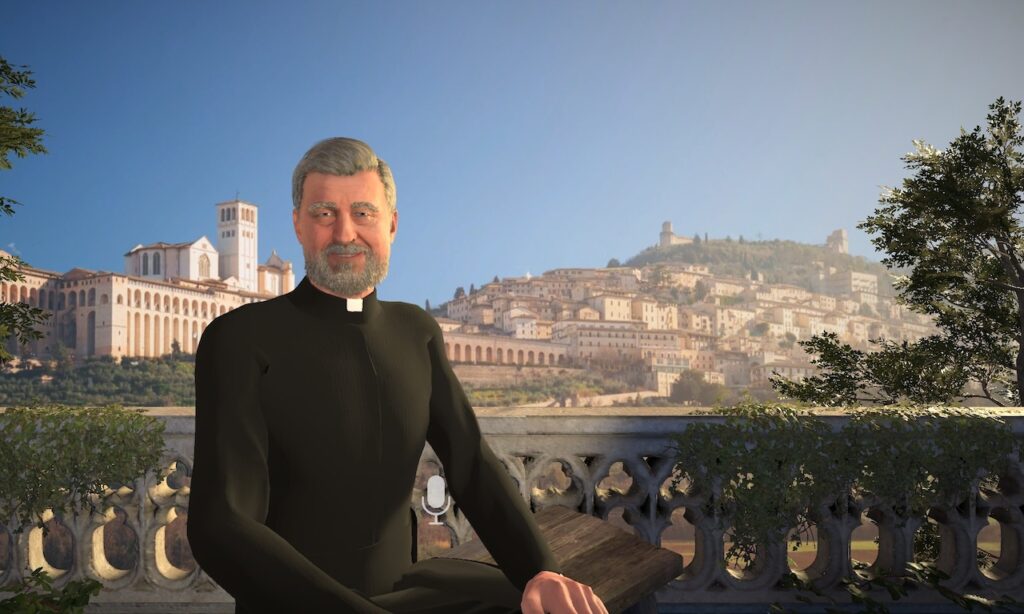To be a Christian means, fundamentally, to have encountered Christ and to have allowed him to change your life. Few understand the centrality of this personal and relational encounter with Christ better than the good people at Catholic Answers.
In an odd way, that may help explain the misstep they made in introducing a customized, anthropomorphized apologetics AI in late April. The only way to interact with “Father Justin,” as Catholic Answers initially named their LLM (large language model), was to speak through your computer microphone to a cartoon avatar of a kindly looking, gray-haired and bearded priest.
The reaction was swift, severe and, sad to say, predictable. Critics savaged Catholic Answers for portraying their LLM as a priest, to which Catholic Answers responded by doubling down on the cartoon avatar but removing his Roman collar and changing his name to just “Justin.”
Both the denizens of social media and journalists in traditional media rushed to find the right questions to get the AI to make an egregious mistake, with the worst being when “Father Justin” agreed to hear a woman’s confession, at the end of which the bot “absolved” her of her sins. (Catholic Answers very quickly addressed that problem, and, when others tried to replicate this woman’s experience, the AI told them that it was unable to administer the sacrament.)
Catholic Answers President Christopher Check and Chief Operating Officer Jon Sorensen both acknowledged that they had made some mistakes but also pointed out that there are potential positive uses for AI even within the Church, and they vowed to forge ahead with “Justin.”
The reality is that everyone, critic and apologist alike, was correct in his own way. There are potential positive uses for AI as a research tool on matters Catholic, as such LLMs as Magisterium AI and CatéGPT have shown. And those projects have sparked very little backlash precisely because they were more limited in their application and did not anthropomorphize their LLMs, much less portray them as priests with whom you could have a conversation.
A non-anthropomorphic AI trained on the Catechism and other magisterial docs, along with the entire corpus of apologetics material that Catholic Answers has produced in the 45 years since its founding, would also have made a splash, but in a much better way.
But both critic and apologist alike missed one very important reality that will always limit the usefulness of AI not only in matters Catholic, but in everything that touches on the workings of the human soul. While an AI model can be judged to be more or less accurate in its answers, it can never intentionally tell the truth, not only because intentionality requires an action of the will (which AIs, it should not be necessary to point out, do not have), but also because truth is something very different from mere accuracy.
An AI may be able to offer a more or less accurate definition of “truth”; but only a human can know the truth, much less encounter the Truth who sets us free, and share the experience of that encounter with others who haven’t had that experience yet.
When Christ declared himself the Way, and the Truth, and the Life, he was not speaking of meticulously engineered maps, or mathematical calculations accurate to a hundred decimal places, or the chemical formula for DNA.
He was speaking of the encounter he calls each one of us to on our own road to Damascus or Emmaus, an encounter that draws our soul further up and further into the truth that we experience most fully here on earth in the sacraments of the Church, those channels of grace through which our souls are united to the very life of God.
No soulless algorithm, which operates by predicting which word is most likely to be accurate if it is placed after the one it has just spewed forth, can draw us into that encounter, even if it is wearing a human face and a Roman collar.
That, instead, is the work of true priests and catechists and apologists – and the work that each of us who has encountered Christ is called to do in the lives of everyone we meet.
The Our Sunday Visitor Editorial Board consists of Father Patrick Briscoe, O.P., Gretchen R. Crowe, Matthew Kirby, Scott P. Richert and York Young.

